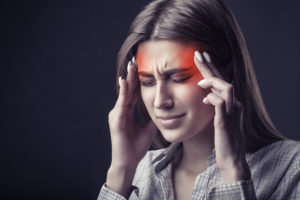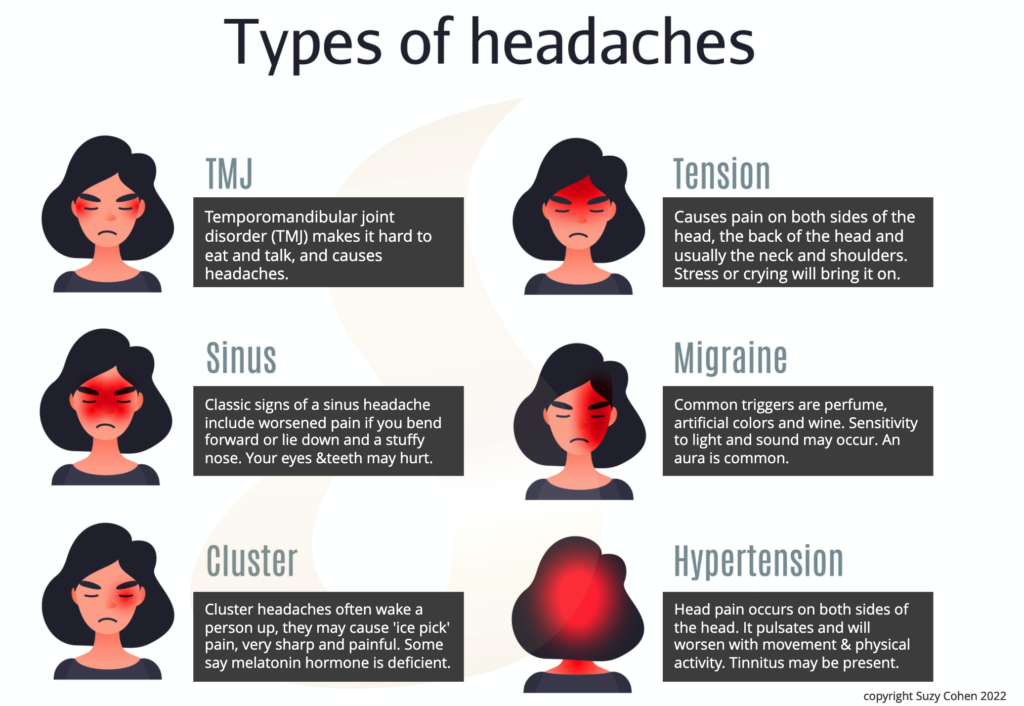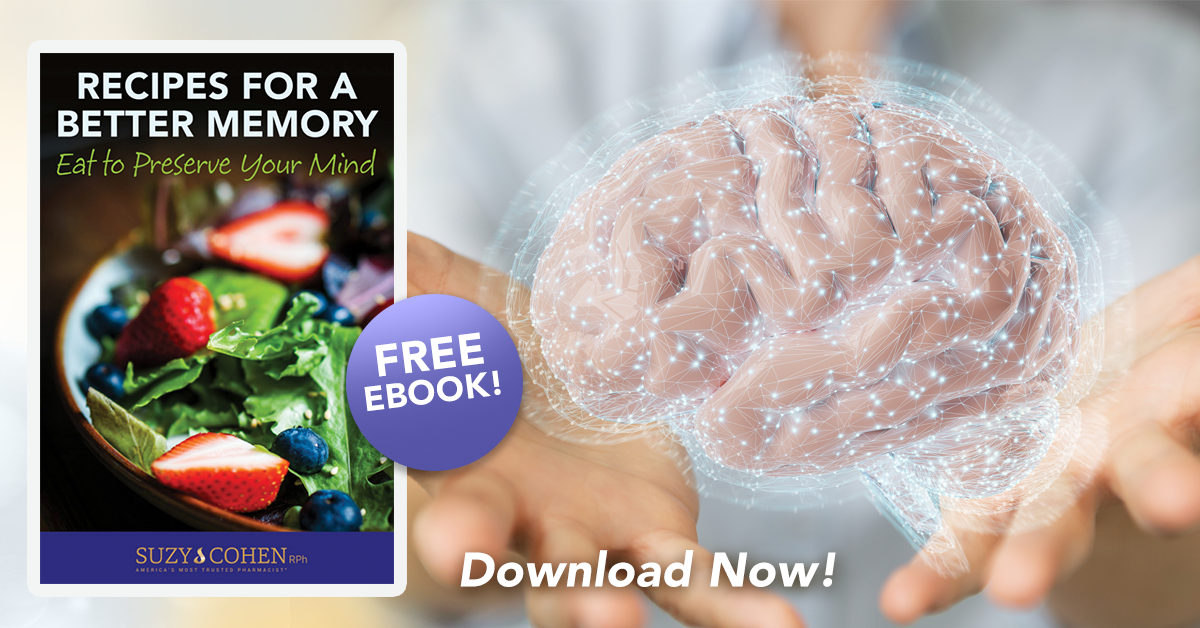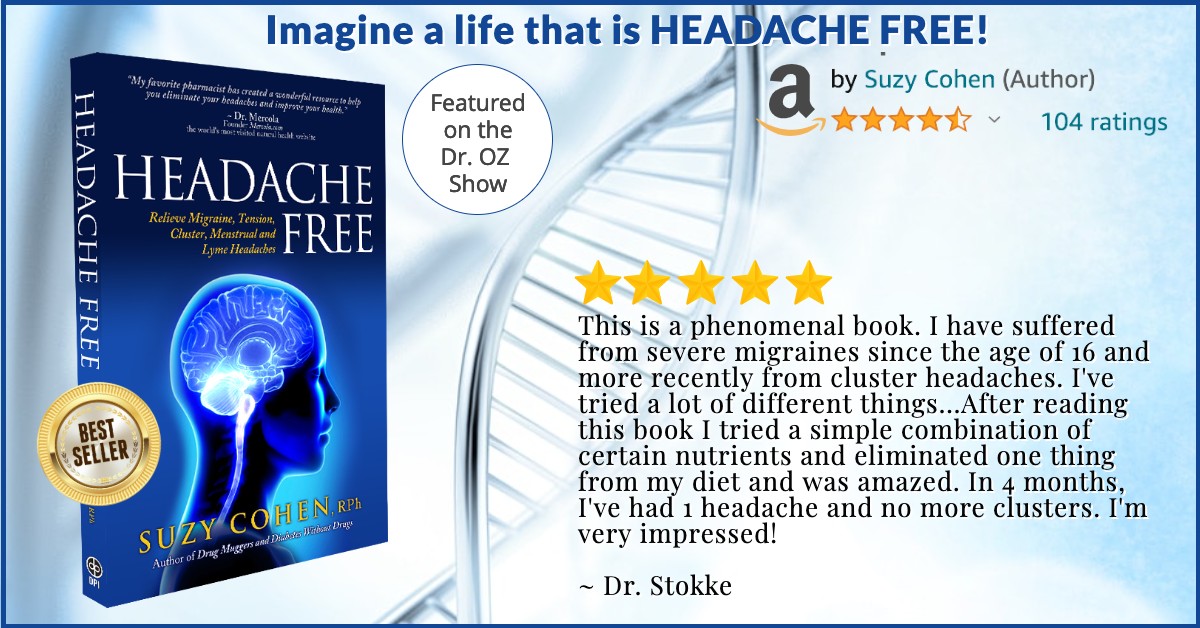What's On This Page?
ToggleHaving a headache is common, and probably 80 percent of people experience one in their life. There are all sorts of headache disorders such as migraines, tension, hormonal and cluster headaches. Popular medications can cause a bad headache including the category of ACE inhibitors (and ARBs) which effectively solve high blood pressure. Scroll below for some medications and treatments that can help with intracranial pressure.
See this ARTICLE for natural remedies for high blood pressure. These ACE inhibitors and ARBs are anti-hypertensive pills that were made famous with the pandemic because they block the ACE receptor.
 But what about intracranial headaches due to high pressure on the brain, have you heard of that? It’s a serious problem and I think it is important for you to understand what that type of headache feels like. It’s also critical to distinguish this form a migraine or other types of headaches like the ones that can come from cheese. You can read more about that HERE.
But what about intracranial headaches due to high pressure on the brain, have you heard of that? It’s a serious problem and I think it is important for you to understand what that type of headache feels like. It’s also critical to distinguish this form a migraine or other types of headaches like the ones that can come from cheese. You can read more about that HERE.
This type of a headache is a serious problem and you should not “wait and see” what happens. I think it’s important for you to understand that it is different from a migraine or cluster.
Probably the most common symptom of intracranial hypertension (aside from the headache itself) is eye complications! You may have blind spots, poor peripheral (side) vision, blurry vision, double vision, and temporary bouts of vision loss. Left untreated, many people experience permanent vision loss.
An intracranial headache happens when there is increased intracranial pressure (ICP) in the brain. Usually, in the past, you saw this occur after a traumatic brian injury (TBI), car accident, sports injury or any disease involving the spinal cord.
It wasn’t that common except in the elderly population with high risk of a stroke, hydrocephalus or aneurysm. Nowadays, I get questions about severe, moving headaches frequently, so I’ve been researching the cause of these.

The hallmark symptom of course is a severe headache, one that might even move quickly around your head! It may be sharp and severe, or may feel like a dull, aching pressure that make your eyes hurt. You may feel less alert, and a bit confused but also possibly restless. As the pressure rises in your brain, you may become less able to speak like normal, and more weak.
It may feel like it’s a little bit harder to breathe. These symptoms can come on in minutes, and wake you in the middle of the night.
This is not a headache you can treat at home, this is a medical emergency in many cases because it could mean impending stroke or blindness. Taking an aspirin for this might make it worse due to increasing the pressure of blood on the brain, remember the brain is encased in a small, fixed compartment that does not expand!
There are however a number of cases where individuals can walk around and sort of function in life with mild ICP. And this may be you if you’ve been to dozens of doctors for your weird, unrelenting headaches.
For example, some people have mildly elevated ICP and frequent headaches because they have Chiari malformation, fibromyalgia, autoimmune encephalopathy, obesity with BMI over 30, iron deficiency anemia, slow-growing brain tumors, kidney disease, Lyme disease, respiratory infections, anxiety due to accompanying hypertension. For these situations, the symptoms I listed above are not severe enough to require hospitalization but still disabling.
Another interesting point is hyperthyroidism. That condition alone, or the medications used to treat hypothyroidism (yes, I do mean hypothyroidism) can raise intracranial pressure. It occurs due to the use of thyroxine which is used to treat hypothyroidism. This drug raises thyroid hormone levels, therefore if your medication dose is too high for you, it changes the amount of blood flowing into the brain. It increases the blood flow to the brain, thus raising ICP (intracranial pressure).
This produces a mild headache due to mildly elevated ICP. Discontinuing the medication, or pausing it would obviously help and you can discuss this with your physician. You can also see why I highly recommend natural herbal remedies to improve thyroid gland function because it’s easy to mess up on the drugs and cause more problems than you had to begin with. Be very careful with your thyroid medications, and see your physician for routine blood work and dosage adjustments.
It’s because of the mild elevation in ICP that isn’t severe enough to prompt you to drive to the E.R. If you have symptoms of intracranial hypertension and headaches, I urge you to get medical attention. Today, we are seeing more and more of this problem for some reason. It can be evaluated with a lumbar puncture that assesses the pressure of your cerebrospinal fluid (CSF). A visual examination looking for papilledema is critical as part of the basic workup.
What Medications and Treatments Help?
Intracranial pressure can be elevated due to various causes, such as a brain injury, hydrocephalus, brain tumor, or other neurological conditions. The management of elevated ICP generally depends on the underlying cause and can include:
Medications to reduce brain swelling, such as corticosteroids or mannitol. Scroll below for more information about mannitol.
Sedatives to reduce brain metabolic demand.
Surgery, such as a shunt to drain excess cerebrospinal fluid, or in severe cases, decompressive craniectomy.
Positioning the head in a way that promotes venous drainage from the brain.
Hyperventilation (under medical supervision) to temporarily reduce ICP in emergency settings.
Anticonvulsant medications if seizures are contributing to the increased ICP.
Control of blood pressure to optimize cerebral perfusion. In this aspect, maintaining proper (normal) blood pressure is important.
Mannitol for ICP
Mannitol is a medication but it also has other uses. In the medical field, mannitol is used as what’s called an osmotic diuretic to increase urine production, basically make you pee more! And it is particularly known for its ability to reduce intracranial pressure (which as you now know means higher pressure inside the skull).
Mannitol can help reduce intraocular pressure (pressure inside the eyes). It draws excess fluid out of the brain and eyes by increasing the concentration of solutes in the blood, thereby drawing fluid into the bloodstream… taking pressure off the brain. That’s what you want. It is administered via an IV in a medical setting usually or acute head injuries, serious glaucoma, or certain other conditions where pressure reduction is needed quickly.
In addition to its medical uses, mannitol is also used as a sweetener and food additive. In this context, it can be considered as a dietary ingredient. It’s often used in sugar-free and low-calorie foods because it has a sweet taste but is poorly absorbed by the body, so it contributes fewer calories than regular sugar.
While mannitol has applications both as a medication and as a food additive, when people refer to mannitol they are often referring to its use as a medication, particularly in emergency and critical care settings for managing elevated intracranial or intraocular pressure.
It’s critical for the management of intracranial pressure to be guided by a healthcare professional, preferably a specialist such as a neurologist or neurosurgeon. If you or someone you know is experiencing symptoms of elevated intracranial pressure (such as severe headaches, nausea, vomiting, altered consciousness, or neurological deficits), it’s important to seek medical attention immediately.
I hope this article has been helpful in terms of enlightening you about the new type of headache we are seeing. It’s useful to know the symptoms in case you or a loved one experiences it. For more information visit the Intracranial Hypertension Research Foundation.
If you are interested in more information on headaches, check out my article Headaches, Time to Get Your Thyroid Checked

Suzy Cohen, has been a licensed pharmacist for over 30 years and believes the best approach to chronic illness is a combination of natural medicine and conventional. She founded her own dietary supplement company specializing in custom-formulas, some of which have patents. With a special focus on functional medicine, thyroid health and drug nutrient depletion, Suzy is the author of several related books including Thyroid Healthy, Drug Muggers, Diabetes Without Drugs, and a nationally syndicated column.




